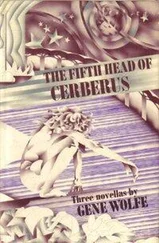During all this time, and all the much longer periods that preceded and followed it, I was acutely uncomfortable. The spiders’ webs, which I came gradually to perceive were common fishing nets, had not been removed; but I had been bound with ropes as well, so that one arm was tightly pinioned by my side and the other bent until the fingers of my hand, which soon grew numb, almost touched my face. At the height of the action of the drug I had become incontinent, and now my trousers were soaked with urine, cold and stinking. As my hallucinations grew less violent and the intervals between them longer, the misery of my circumstances afflicted me more, and I became fearful of what would happen to me when I was eventually taken from the windowless storeroom into which I had been cast. I supposed that the hetman had learned from some estafette that I was not what I had pretended to be, and no doubt also that I was fleeing the archon’s justice; for I assumed that he would not otherwise have dared to treat me as he had. Under these circumstances, I could only wonder whether he would dispose of me himself (doubtless by noyade, in such a place), deliver me to some petty ethnarch, or return me to Thrax. I resolved to take my own life should the opportunity be afforded me, but it seemed so improbable that I should be given the chance that I was ready to kill myself in my despair.
At last the door opened. The light, though it was only that of a dim room in that thick-walled house, seemed blinding. Two men dragged me forth as they might have pulled out a sack of meal. They were heavily bearded, and so I suppose it was they who had appeared, when they burst in upon Pia and me, to have the pelts of animals for faces. They set me upon my feet, but my legs would not hold, and they were forced to untie me and to remove the nets that had taken me when the net of Typhon had failed. When I could stand again, they gave me a cup of water and a strip of salt fish.
After a time the hetman came in. Although he stood as importantly as he was no doubt accustomed to stand when he directed the affairs of his village, he could not keep his voice from quavering. Why he should still be frightened of me I could not understand, but plainly he still was. Since I had nothing to lose and everything to gain by the attempt, I ordered him to release me.
“That I cannot do, Grand Master,” he said. “I am acting under instructions.”
“May I ask who has dared tell you to act in this fashion toward the representative of your Autarch?”
He cleared his throat. “Instructions from the castle. My messenger bird carried your sapphire there last night, and another bird came this morning, with a sign that means we are to bring you.”
At first I supposed he meant Acies Castle, where one of the squadrons of dimarchi had its headquarters, but after a moment I realized that here, two score leagues at least from the fortifications of Thrax, it was most unlikely that he would be so specific. I said, “What castle is that? And do your instructions preclude my cleaning myself before I present myself there? And having my clothing washed?”
“I suppose that might be done,” he said uncertainly; then to one of his men: “How stands the wind?”
The man addressed gave a half shrug that meant nothing to me, though it seemed to convey information to the hetman.
“All right,” he told me. “We can’t set you free, but we’ll wash your clothes and give you something to eat, if you wish it.” As he was leaving, he turned back with an expression that was almost apologetic. “The castle is near, Grand Master, the Autarch far. You understand. We have had great difficulties in the past, but now there is peace.”
I would have argued with him, but he gave me no chance. The door shut behind him.
Pia, now dressed in a ragged smock, came in a short time later. I was forced to submit to the indignity of being stripped and washed by her; but I was able to take advantage of the process to whisper to her, and I asked her to see that my sword was sent wherever I was — for I was hoping to escape, if only by confessing to the master of the mysterious castle and offering to join forces with him. Just as she had ignored me when I had suggested that she might float the weight of her chain on a stick of firewood, she gave no indication of having heard me now; but a watch or so later, when, dressed once more, I was being paraded to a boat for the edification of the village, she came running after our little procession with Terminus Est cradled in her arms. The hetman had apparently wanted to retain such a fine weapon, and remonstrated with her; but I was able to warn him as I was being dragged on board that when I arrived at the castle I would inform whoever received me there of the existence of my sword, and in the end he surrendered.
The boat was a kind I had never seen before. In form it might have been a xebec, sharp fore and aft, wide amidships, with a long, overhanging stern and an even longer prow. Yet the shallow hull was built of bundles of buoyant reeds tied together in a sort of wickerwork. There could be no step for a conventional mast in such a frail hull, and in its place stood a triangular lash-up of poles. The narrow base of the triangle ran from gunwale to gunwale; its long isosceles sides supported a block used, just as the hetman and I clambered aboard, to hoist a slanting yard that trailed a widely striped linen sail. The hetman now held my sword, but just as the painter was cast off, Pia leaped into the boat with her chain jangling.
The hetman was furious and struck her; but it is not an easy matter to take in the sail of such a craft and turn it about with Sweeps, and in the end, though he sent her weeping to the bow, he permitted her to stay. I ventured to ask him why she had wanted to come, though I thought I knew.
“My wife is hard on her when I am not at home,” he told me. “Beats her and makes her scrub all day. It’s good for the child, naturally, and it makes her happy to see me when I come back. But she would rather go with me, and I don’t greatly blame her.”
“Nor do I,” I said, trying to turn my face away from his sour breath. “Besides, she will get to see the castle, which I suppose she has never seen before.”
“She’s seen the walls a hundred times. She comes of the landless lake people, and they are blown about by the wind and so see everything.”
If they were blown by the wind, so were we. Air as pure as spirit filled the striped sail, made even that broad hull heel over, and sent us scudding across the water until the village vanished below the rim of the horizon — though the white peaks of the mountains were still visible, rising as it seemed from the lake itself.
SO PRIMITIVELY ARMED were these lakeshore fisherfolk — indeed, far more primitively than the actual autochthonous primitives I had seen about Thrax — that it was some time before I understood that they were armed at all. There were more on board than were needed to steer and make sail, but I assumed at first that they had come merely as rowers, or to add to the prestige of their hetman when he brought me to his master at the castle. In their belts they carried knives of the straight, narrow-bladed kind fishermen everywhere use, and there was a sheaf of barb-headed fishing spears stowed forward, but I thought nothing of that. It was not until one of the islands I had been so eager to see came into view and I noticed one of the men fingering a club edged with animal teeth that I realized they had been brought as a guard, and there was in fact something to guard against.
The little island itself appeared unexceptional until one saw that it truly moved. It was low and very green, with a diminutive hut (built like our boat of reeds and thatched with the same material) at its highest point. A few willows grew upon it, and a long narrow boat, again built of reeds, was tied at the water’s edge. When we were closer, I saw that the island was of reeds too, but of living ones. Their stems gave it its characteristic verdescence; their interlaced roots must have formed its raftlike base. Upon their massed, living tangle, soil had accumulated or been stored up by the inhabitants. The trees had sprouted there to trail their roots in the waters of the lake. A little patch of vegetables flourished.
Читать дальше










